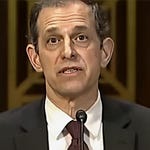Ralph welcomes the editorial director and publisher of the Nation magazine, Katrina vanden Heuvel, to offer her expert insight into ways the U.S. can peacefully resolve our conflict with Russia over Ukraine. Plus, former Nuclear Regulatory Commissioner, Peter Bradford, updates us on the latest rise from the dead of that dangerous zombie technology known as nuclear power.
Katrina vanden Heuvel is editorial director and publisher of the Nation magazine and writes a weekly column for the Washington Post. She has also edited or co-edited several books, including Meltdown: How Greed and Corruption Shattered Our Financial System and How We Can Recover.
The Exit from the Ukraine Crisis That’s Hiding in Plain Sight
I think this agreement (the Minsk agreement)… is a possibility [to resolve the current crisis in Ukraine]. But it needs space, and it needs patience, and you know I think that is in lack of supply in our political culture.
Katrina vanden Heuvel
The demonization of Putin is not a policy, it’s an alibi for a policy. And it has also led to the ability to think about war. If you demonize something, or someone, or a country, it’s easier to see why one would go to war.
Katrina vanden Heuvel
I continue to think the more time that elapses, the more possibility for diplomacy. And the more possibility for face-saving maneuvers.
Katrina vanden Heuvel
This reminds me of how World War I started, with the assassination of the Archduke in Sarajevo in Serbia. And then it went like lightning through a bunch of egos, who all knew each other… they had intermarriage with each other’s families, but they had their egos involved. And you know 25 million people were killed in World War One.
Ralph Nader
Peter Bradford is a former member of the U.S. Nuclear Regulatory Commission and the former chair of the New York and Maine utility regulatory commissions. He has taught at the Yale School of Forestry and Environmental Studies and is currently an adjunct professor at Vermont Law School, where he teaches Nuclear Power and Public Policy. He is vice chair of the board of the Union of Concerned Scientists and is the author of Fragile Structures: A Story of Oil Refineries, National Securities and the Coast of Maine. He is also the author of an article entitled “When the Unthinkable is Deemed Impossible: Reflecting on Fukushima.”
[New nuclear agreements] basically permitted the utilities to start charging the customers for nuclear plants the day they started building them. And that transferred a bunch of risks– the financial risks, the risks of cancellation– from investors to customers. And that’s the only way you can finance these things. Because sophisticated investors won’t take those risks, they insist on shifting them either to taxpayers or customers.
Peter Bradford
The old myth about environmentalists turning out and blocking the gates [at nuclear plants], that’s gone. And none of the plants that have closed in recent years have been closed by environmental opposition. They’ve all failed economically.
Peter Bradford
Betting a big chunk of our climate change strategy on what’s essentially a fantasy land is a pretty dubious proposition. And the “All of the above” strategy that’s used to justify this is just… it’s ridiculous to call it a strategy. We don’t do “All of the above” with regard to other serious problems. We don’t use caviar to fight world hunger.
Peter Bradford
Additional Resources:
Nuclear Information Resource Service
World Nuclear Industry Status Report














